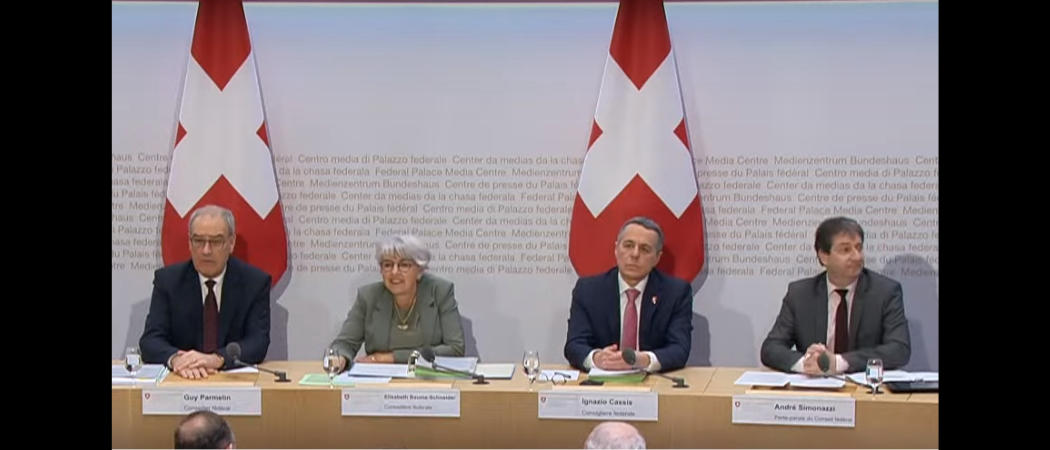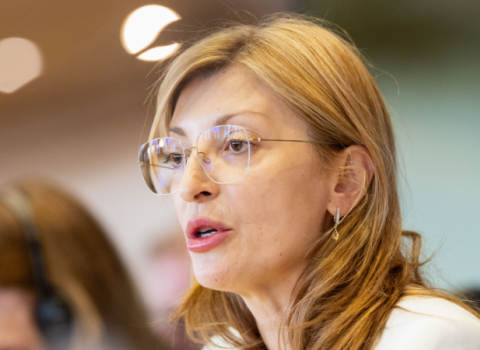The latest step in negotiations between Brussels and Bern opens the door for Switzerland to finally start participating in part of Horizon Europe. But there are still political hurdles to clear

The press conference following the decision by the Swiss Federal Council to approve the draft negotiating mandate with the European Union on December 15, Photo: The Federal Council of Switzerland
The EU and Switzerland have made further progress in talks about their relationship, opening the door for Swiss academics to apply for European Research Council (ERC) grants from next year.
On 15 December, Switzerland’s ruling Federal Council signed off a draft negotiating mandate with the EU, paving the way for formal negotiations to start next year. That followed on from 18 months of exploratory talks about everything from food safety to financial markets.
This was an expected step, but less anticipated was an announcement by the Commission confirming that after formal talks start, Swiss researchers will be able to apply to the ERC for 2024 calls, even before Horizon Europe association is agreed.
“We didn’t expect that,” said Xavier Pilloud, head of office at Netzwerk Future, a grouping of Switzerland’s universities, research funders and MPs. “It’s very good news.”
Switzerland has long been associated to EU research and innovation framework programmes, but has been shut out of Horizon Europe after the Swiss in 2021 walked away from negotiations to revamp the country’s relationship with the EU.
Since then, however, technical talks have continued in the background, and now the two sides are moving forward to finally re-start formal talks, which will include negotiations to associate to Horizon Europe.
When these talks start – likely sometime in the spring – the EU will enact “transitional measures” to allow Swiss academics to apply for ERC grants in 2024, according to the Commission, even before association is agreed. The first ERC call to be eligible should be the 2024 advanced grants, which is due to open on 29 May.
This is a faster timeline than some in Switzerland had anticipated, as there were fears association would have to be fully agreed before any applications could be made.
“This news is a huge relief for the entire Swiss academic community,” said Luciana Vaccaro, president of the umbrella body swissuniversities.
“Transitional arrangements will allow us to begin accepting applications from researchers based in Switzerland once again as from the calls under the ERC’s 2024 Work Programme,” said ERC president Maria Leptin in a statement.
Both sides now say they want to wrap up negotiations on the wider Brussels-Bern relationship in 2024.
A welcome step forward
But it’s not a done deal just yet. To actually progress to formal talks, the Commission needs to win a negotiating mandate from the European Council, and the Swiss Federal Council must consult with cantons and lawmakers first.
“We warmly welcome this step forward, but there is still a long way to go,” said Yves Flückiger, rector of the University of Geneva.
“Formal negotiations for Switzerland’s full association to the EU research, innovation and education programmes can only begin once the Swiss and EU global negotiation mandates have been adopted, probably not before March 2024,” he said.
What’s more, transitional arrangements, which allow researchers to apply before Horizon association is agreed, will only apply to the ERC for 2024 calls. For the rest of Horizon Europe, transitional arrangements will apply for 2025 calls.
This is likely because it’s much simpler to allow Swiss researchers to apply for the handful of 2024 ERC calls, rather than opening up the whole of Horizon Europe when talks start, said Pilloud.
And of course, Horizon association will have to be agreed before Swiss applicants to the ERC, or any other parts of the programme, can actually receive any money.
Both sides will want to avoid a repeat of what happened with the UK, where academics could apply to Horizon Europe programmes but could not receive any money because association was not signed off.





 A unique international forum for public research organisations and companies to connect their external engagement with strategic interests around their R&D system.
A unique international forum for public research organisations and companies to connect their external engagement with strategic interests around their R&D system.